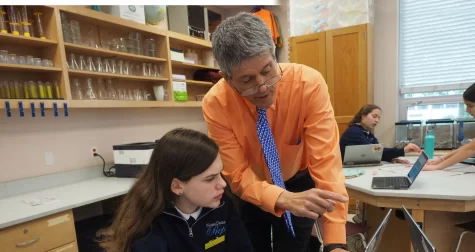Confidence is Key

March 11, 2015
Each and every NDP student is unique in her own special way, and yet there are some things we all have in common. Perhaps the most obvious of which is that we are all girls. But what does that mean for our futures…besides the fact that we are allowed to wear both dresses and pants? For one thing, if the status quo remains the same, we are destined to make a mere 78% of what our male counterparts make for the same work. This statistic has been known for years now, and yet nothing has changed. More recently, there has been growing concern about the lack of women in science and technology careers. This raises many questions. We know fewer women become scientists and technology developers than men, but what we do not know is why. Some wonder if it is because women do not have brains wired properly for this sort of work, and yet this is disproved by the fact that when women do find their way into these sorts of careers, they tend to excel. Others wonder if colleges and companies are biased against admitting females, and though this is certainly possible, it is more likely that the bias is unconscious. But then there is a third terrifying potential cause for this disparity: the lack of confidence women feel in their own intelligence.
A recent Israeli study may provide answers as to where this lack of confidence stems from. According to that study, as early as elementary school, the unconscious biases of teachers may be causing them to discourage girls from pursuing math and science. The students involved in the study were given two math tests, one was graded by outsiders who did not know the identity of the student whose test they were grading, while the other was graded by a teacher who knew their gender. On the anonymously graded test, the female students outscored the males, yet, on the test graded by their teachers, girls were scored much lower. The study went on to observe the effect this had on those students over time. They discovered that when those kids reached high school, the boys were much more likely to take advanced math classes than girls and scored better on national exams. It should be noted firstly that this is just one aspect of the study, and secondly that this is just one study which shows one potential answer to a hotly debated question.
So how do we use this information to our advantage? Well, for us at NDP, we have it better than most. All of our teachers have chosen to work in an all girls’ school because they believe in the ability of girls to succeed, and thus they encourage us every day. We are not being compared to male students, and thus biases are less likely to form on our part or on the part of our teachers. And with our Women in Science program, NDP actively combats the lack of women in science and tech by encouraging us to explore the world of STEAM. As grateful as we are to be in this encouraging environment, it is important to remember our confidence even beyond these halls. Girls are told all the time that confidence is beauty, but much much more importantly, confidence has a lot to do with intelligence as well. Our teachers know we are very smart, but do we recognize the ability we ourselves possess?
Miller, Claire Cain. “How Elementary School Teachers’ Biases Can Discourage Girls From Math and Science.” The New York Times. The New York Times, 06 Feb. 2015. Web. 19 Feb. 2015. .






